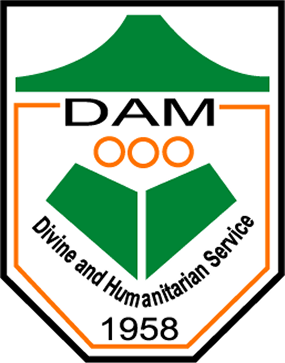
About Dhaka Ahsania Mission:

Dhaka Ahsania Mission (DAM) is a national level non-government development organization founded by Khan Bahadur Ahsanullah (Rm), an eminent educationist, reformer and Sufi. The founding motto of DAM is ‘Divine and humanitarian service’. It functions since 1958 pursuing the aims of social and spiritual development of entire human community. Over the past 67 years, DAM has made significant contribution in different aspects of human life including education, health, human rights, poverty alleviation, livelihood, micro-finance and climate change. In addition, DAM runs a number of institutions-35, projects-36 and social enterprises to spread its services, enhance the sector capacity and add value to a number of national efforts.
Key Focus Areas
- Education: DAM runs thousands of non‑formal Children’s Learning Centers (CLCs) in rural and urban slum areas, providing five grades of primary education in four years. In partnership with international organizations, DAM educates over 60,000 out‑of‑school children across more than 26 districts.
- Health: Health Sector is one of the three core sectors of DAM. Once a small entity of AMIC, has now become one of the sustainable sectors of the organization. Health Sector also operates the Ahsania Mission Cancer & General Hospital—the largest cancer hospital in Bangladesh—which provides free or subsidized care to many low‑income patients.
- Economic Empowerment & Development: DAM implements programs in technical and vocational training, agriculture, WASH (water, sanitation and hygiene), micro‑finance, and livelihood support to help the poor become self‑reliant.
- Advocacy & Policy: The organization promotes rights‑based and evidence‑based policy for education, women’s empowerment, health, and climate resilience.
- Disaster Response: DAM has extensive experience in emergency response and rehabilitation, including work during floods, cyclones, pandemics, and refugee crises (e.g. Rohingya response), and leads key humanitarian networks in Bangladesh.
Impact & Recognition
- Beneficiaries: Across the past decades, DAM has served over millions of individuals, covering education, health, livelihood, governance, climate resilience, and rights interventions.
- Awards: It received Bangladesh’s Independence Day Award in 2002 the highest state award, along with numerous international honors including the UNESCO Literacy Prize, AGFUND Prize, ISESCO Prize, and more.
- Partnerships & Status: DAM holds consultative status with UN ECOSOC and UNESCO, UNDP, UNICEF, and others. It has also been globally ranked among the largest and most impactful NGOs.
Overview of the DAM’s Road Safety Project:
Dhaka Ahsania Mission (DAM), with support from the Global Road Safety Partnership (GRSP) hosted by the International Federation of Red Cross and Red Crescent Societies (IFRC), implemented the project titled “Advocacy for Stronger Road Safety Legislation in Bangladesh” from March 2021 to till now. This national-level initiative aimed to reduce the alarming number of road traffic deaths and injuries in Bangladesh by advocating for legislative and policy reforms.
The project focused on building political and institutional support to address the policy gaps in the existing law and supported the development of comprehensive rules under the RTA-2018. It emphasized the need for evidence-based amendments to enhance the safety of all road users, particularly children and vulnerable groups. The initiative also engaged media professionals and civil society to generate public awareness and mobilize demand for safer road conditions, while fostering collaboration among stakeholders including policymakers, transport authorities, legal experts, and GRSP grantees.
Building on DAM’s strong track record in policy advocacy—such as its contributions to tobacco control, drug prevention legislation, and HIV/AIDS response—the project was implemented through DAM’s Health Sector, which has identified road safety as a vital public health priority aligned with national and global development goals. The project contributed to ongoing national efforts to create a safer, more accountable, and inclusive road transport system in Bangladesh by promoting rights-based and health-centered legislative reforms.